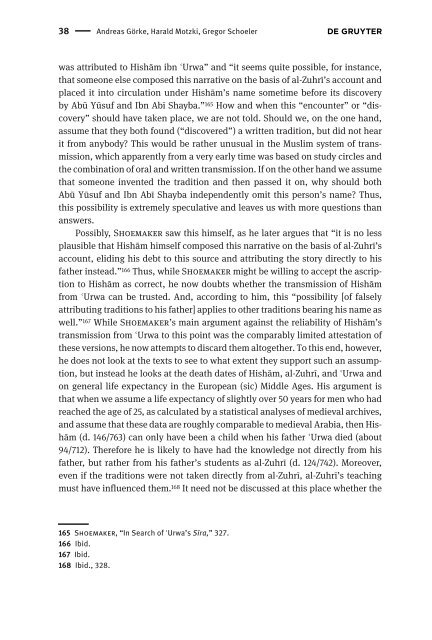0021-1818_islam_98-1-2-i-259
0021-1818_islam_98-1-2-i-259
0021-1818_islam_98-1-2-i-259
You also want an ePaper? Increase the reach of your titles
YUMPU automatically turns print PDFs into web optimized ePapers that Google loves.
38 Andreas Görke, Harald Motzki, Gregor Schoeler<br />
was attributed to Hisham ibn ^Urwa” and “it seems quite possible, for instance,<br />
that someone else composed this narrative on the basis of al-Zuhr\’s account and<br />
placed it into circulation under Hisham’s name sometime before its discovery<br />
by Abu Yusuf and Ibn Ab\ Shayba.” 165 How and when this “encounter” or “discovery”<br />
should have taken place, we are not told. Should we, on the one hand,<br />
assume that they both found (“discovered”) a written tradition, but did not hear<br />
it from anybody? This would be rather unusual in the Muslim system of transmission,<br />
which apparently from a very early time was based on study circles and<br />
the combination of oral and written transmission. If on the other hand we assume<br />
that someone invented the tradition and then passed it on, why should both<br />
Abu Yusuf and Ibn Ab\ Shayba independently omit this person’s name? Thus,<br />
this possibility is extremely speculative and leaves us with more questions than<br />
answers.<br />
Possibly, Shoemaker saw this himself, as he later argues that “it is no less<br />
plausible that Hisham himself composed this narrative on the basis of al-Zuhr\’s<br />
account, eliding his debt to this source and attributing the story directly to his<br />
father instead.” 166 Thus, while Shoemaker might be willing to accept the ascription<br />
to Hisham as correct, he now doubts whether the transmission of Hisham<br />
from ^Urwa can be trusted. And, according to him, this “possibility [of falsely<br />
attributing traditions to his father] applies to other traditions bearing his name as<br />
well.” 167 While Shoemaker’s main argument against the reliability of Hisham’s<br />
transmission from ^Urwa to this point was the comparably limited attestation of<br />
these versions, he now attempts to discard them altogether. To this end, however,<br />
he does not look at the texts to see to what extent they support such an assumption,<br />
but instead he looks at the death dates of Hisham, al-Zuhr\, and ^Urwa and<br />
on general life expectancy in the European (sic) Middle Ages. His argument is<br />
that when we assume a life expectancy of slightly over 50 years for men who had<br />
reached the age of 25, as calculated by a statistical analyses of medieval archives,<br />
and assume that these data are roughly comparable to medieval Arabia, then Hisham<br />
(d. 146/763) can only have been a child when his father ^Urwa died (about<br />
94/712). Therefore he is likely to have had the knowledge not directly from his<br />
father, but rather from his father’s students as al-Zuhr\ (d. 124/742). Moreover,<br />
even if the traditions were not taken directly from al-Zuhr\, al-Zuhr\’s teaching<br />
must have influenced them. 168 It need not be discussed at this place whether the<br />
165 Shoemaker, “In Search of ^Urwa’s Sira,” 327.<br />
166 Ibid.<br />
167 Ibid.<br />
168 Ibid., 328.


